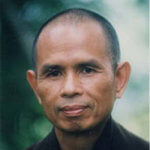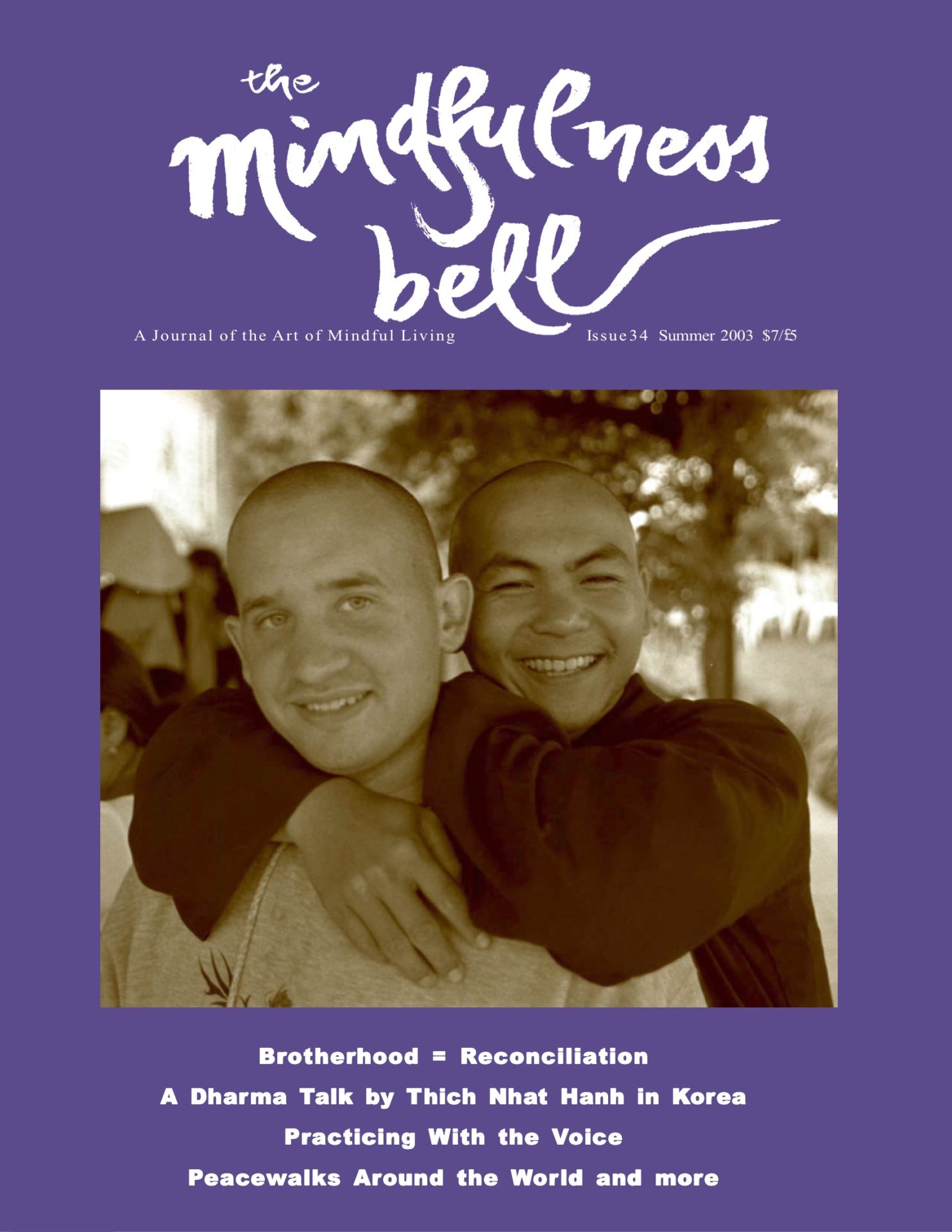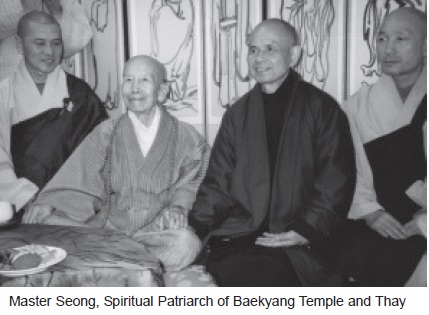
Thich Nhat Hanh was invited to address the audience of a monthly Peace Forum on March 19th, 2003 held for leaders and representatives of various religious communities in South Korea on the topic of “Spiritual Reflections on War and Peace.” The following introduction was given:
Since the winter of 2002, the North Korean nuclear issue has created conflict between the North and the U.S. Since the terrorist attack that occurred in the U.S.

Thich Nhat Hanh was invited to address the audience of a monthly Peace Forum on March 19th, 2003 held for leaders and representatives of various religious communities in South Korea on the topic of “Spiritual Reflections on War and Peace.” The following introduction was given:
Since the winter of 2002, the North Korean nuclear issue has created conflict between the North and the U.S. Since the terrorist attack that occurred in the U.S. on September 11th, 2001, many countries have tightened up their security policies. During this crisis, the people of North Korea continue to suffer from famine. Threats between the U.S. and the North have not resulted in any progress towards a workable solution. The economic blockade and nuclear tension continue. Neither North Korea nor the U.S. is ready to make any concessions. Koreans are concerned about the possibility of military conflict on the peninsula. Meanwhile, there is also a potential war in Iraq. The Peace Forum of January 28th made a national declaration that went along with the international wave of appeal for peace. People desire a world without war. The Peace Forum with Thich Nhat Hanh will address these complex issues. Based on his personal memories of the Vietnam War, Thich Nhat Hanh will share his beliefs and practice to lead Korea on the path of peace.
We are invited to enjoy our breathing. Our breath is a bridge that connects our body and our mind. When we go back to our breathing, our mind goes back to our body and we become fully alive, fully present. Breathing in, I feel I am alive. Breathing out, I smile to life.
Dear friends, peace is something that we can cultivate in our daily lives. It is possible to cultivate peace in every moment of our daily lives, while we walk, while we talk, while we sit. I know that peace is made of two elements. The first is understanding and the second is compassion. Cultivating peace means cultivating understanding and cultivating compassion. Every time we go back to ourselves we have the opportunity to do the work of cultivating peace. Every time I breathe in or I make a step I have an opportunity to go back to myself and become fully present in the here and the now.
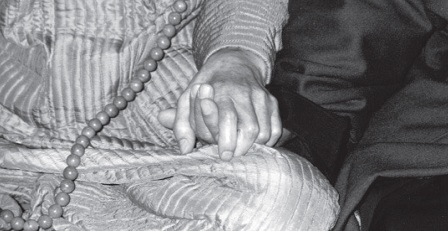
When you drink water, mindfulness helps you to see that the glass of water that you hold in your hand is real. In that moment of mindful drinking, you have no other thought, you are present just for the act of drinking. Mindfulness is the kind of energy that helps us to be aware of what is happening in the present moment. What is happening in the present moment is that I am breathing in or I am making a step or I am drinking water. The energy of mindfulness brings the energy of concentration, and with mindfulness and concentration you have the opportunity to understand reality deeply.
My definition of the Kingdom of God is not a place where there is no suffering. I would not like to live in a place where there is no suffering. I know very well that without suffering there is no way for us to cultivate understanding and compassion. It is by getting in deeply touch with suffering, it is by understanding suffering that compassion arises in our hearts.
Understanding is the Basic Work for Peace
The Buddha advised us not to run away from suffering. Instead we have to confront suffering and look into the heart of suffering. Understanding the nature and cause of suffering is our practice. Suffering is the first Noble Truth; understanding is the second Noble Truth. Without understanding of suffering, the fourth Noble Truth, the path leading to the cessation of suffering, would not be possible.
Suppose we talk about terrorism as suffering. Looking into the nature of terrorism we see fear, we see anger, we see wrong perceptions. If you want to wage a war against terrorism you have to identify the causes of terrorism, namely fear, anger, and wrong perceptions. With fear, anger, and wrong perceptions in you, you become an instrument of terrorism, of war. Your action is motivated by that fear, that anger, and that wrong perception but you think you are acting in the name of truth, the name of justice, and the name of God.
The people who destroyed the twin towers in New York City on September 11th believed they were acting in the name of justice, in the name of God. The people who have gone to drop bombs in Afghanistan, who are going to drop bombs in Baghdad think they are acting in the name of justice, of civilization, of God. But the fact is that we cannot remove fear with fear, we cannot remove anger with anger, and we cannot remove violence with violence.
Imagine you are a citizen of Baghdad and you feel that your country is surrounded by troops and guns ready to attack your country at any moment. Sleeping in Baghdad for just one night with that kind of fear and despair is very damaging to our physical and mental health. Imagine our children who have to live in that situation of fear and despair for several months. In the last few months the people of Iraq have lived in such a situation of anguish, of fear, and of anger. Although the United States of America has not dropped any bombs, the damage can already be seen. It is the U.S. army that is terrorizing the people of Iraq.
If the population of America understood that the people in Iraq are living in anger, in despair, and fear they would not support their government starting a war there. I have many friends who are U.S. citizens who are enlightened, who know that waging a war against Iraq is a wrong thing, but they belong to a minority. They are doing their best to wake up their fellow citizens and they need our help. It is not by shouting against the American government that we can help the cause of peace. It is by doing whatever we can to help the American people to understand what is really going on – that is the basic work for peace.
Reducing Fear
We know very well that the cause of terrorism is fear and wrong perception. I don’t think that the bombs and the guns can identify the cause of terrorism. I don’t think that the military forces can remove wrong perceptions; in fact they can strengthen wrong perceptions. The only way to remove wrong perceptions is to establish a dialogue. The two instruments that you need to use to restore communication are deep listening and loving speech.
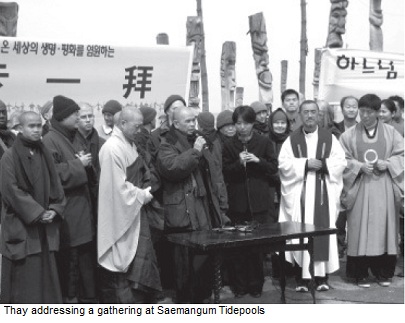
The government and the people of the U.S. can say, “Dear people, we don’t know why you have done such a thing to us. You must have suffered a lot, you must have hated us a lot in order to have done such a thing to us. Have we done something wrong? Please tell us of your suffering, of your anger, of your despair so that we understand and we will be more skillful in the future. If you tell us about your suffering, your difficulties, maybe we shall be able to do something to help. Now it is our deep desire to listen to you, to understand your suffering, your difficulties. We want to understand why you have done this to us.” The government of the United States of America has not used the peaceful methods of deep listening and loving speech. Every time there is a problem, right away they think of using armed forces to solve the problem.
Our political leaders have been trained in political science but not in making peace, inner peace and outer peace. We have to support them to bring a spiritual dimension to our political life. The United States of America may ask this question: Why, when the people of North Korea do not have enough to eat, do they spend money to make nuclear weapons? If we ask this question with all our heart we will find the answer. The answer may be something like this: We are hungry but we have to spend a lot of money and time to make weapons because we are afraid that you will attack us someday. If the Republic of Korea makes it very clear that they are not going to attack North Korea, that declaration will transform fear into brotherhood. I think that the path of peace can be seen clearly if we make some effort to look deeply into the situation. We have to make efforts to help people realize that North and South Korea are brothers, sons of the same mother.
The government and the people of South Korea might like to use an instrument of peace called loving speech. “Dear people in the North, we know that we are brothers and we do not want to see you suffer. As your brother in the South we will make the commitment not to attack the North. It is based on the realization that you are our brother and it would not be correct for a brother to attack a brother. If anyone makes an attempt to attack you, as your brother we will try to protect you.” The people and the government of South Korea can make such a pledge and that will reduce the amount of fear in North Korea. The Government and the people of South Korea can do better; they can convince the United States of America to make the same kind of commitment. I am sure that after the commitment is made, the people of North Korea will not spend more money on armaments but will use that money to better the lives of the people in the North.
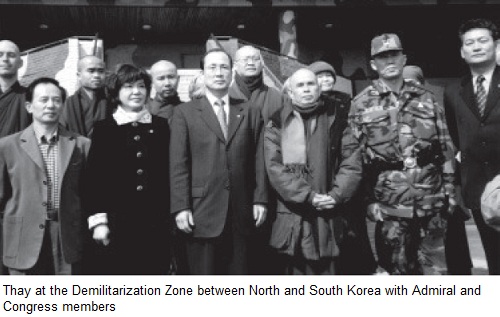
A Proposal for Peace and Reunification
I propose that the Buddhist communities, the Christian communities, and other spiritual communities in South Korea come together and make this proposal to the government and the parliament. You may want to buy a portable telephone and send it to the president of North Korea as a gift. The people of South Korea can request, “Mr. President, please use this phone to talk to our president in the South for ten minutes. We have also sent our president in the South a portable telephone and we have urged him to talk to you for ten minutes every day.” If communication is restored then fear will diminish and the hope for peace will grow. This is an example of skillful means to promote the cause for peace. This is an act of watering the seed of brotherhood that is in everyone, North and South. If we follow this practice of peace then peace will be possible in just a few weeks. This proposal is something that we can do. Religious communities in the South can come together and offer the presidents of North and South Korea one portable telephone and urge their presidents to talk to each other every day about peace, about the hope for reunification.
Dear friends I would like to leave time for some questions and discussion.
Questions and Answers
Q: I am Sister Kim Sunan and I am a Catholic sister. About ten years ago I learned walking meditation from you when you came to Korea. Since then I have been practicing and I have taught some of my students; Christian, non-Christian, and Buddhist and they really appreciate it.
This evening you said that you don’t want to live in a place where there is no suffering because suffering is one way we can learn compassion. I agree and I try to accept suffering and to find meaning in it. In Christianity we have the mystery of the cross, but I have never thought about not wanting to live where there is no suffering. I agree but at the same time I wonder about those people who are not able to bear their suffering, and are deeply hurt by it. What would you suggest for them?
Thay:This is a very good question. First of all, suffering and happiness go together. Without suffering there is no happiness; without happiness there is no suffering. They inter-are. If you don’t know the suffering of separation it is impossible for you to realize the joy of reunification. If you don’t know what hunger feels like, you don’t know the joy of having something to eat. It is against the background of suffering that we can recognize the existence of happiness.
Happiness is made of nonhappiness elements. Suffering is made of non-suffering elements. It is like a flower – a flower is made only of non-flower elements. Nonflower elements are the sunshine, the clouds, the seed, and so on. A flower is made only of non-flower elements; it does not have a separate self. I always remind my students that Buddhism is made only of non-Buddhist elements. If you return the non-Buddhist elements to their source there is no longer such a thing as Buddhism. That is what we call the non-self of Buddhism.
If there is no garbage there cannot be flowers, because garbage is used to make compost which will bring the flowers to us. If you can look deeply, then when you look into a flower you can see the garbage that has helped to make the flower possible. If you look into a heap of garbage you can see cucumbers, lettuce, and tomatoes because you know that it is possible to transform garbage into vegetables.
There is garbage in us, namely violence, jealousy, and anger. But if we are good gardeners we will not be afraid of this garbage because we know how to transform the garbage in us into flowers, the flowers of understanding and compassion. The practice of spirituality is not one of running away from suffering. It is the practice of learning how to transform suffering into well-being. A good practitioner knows the exact amount of suffering that she or he needs. If we allow suffering to overwhelm us we will die; that is why we need the exact amount of suffering that will help us to understand and to love. If the amount of suffering is huge in our society, it is because not many of us know how to transform the garbage back into flowers.
My definition of the Kingdom of God is a place where there is understanding and compassion. And it is thanks to the amount of understanding and compassion that we have that we can transform suffering into well-being. I think that a healthy spiritual tradition dispenses the teaching and the practice that can help us to transform suffering with the instruments of understanding and compassion.
Restoring Communication, Restoring Harmony
Q: Thay, I would like to make a very honest, heart-felt confession to you. When I listened to your Dharma talk, I felt deep shame, guilt, and humiliation as a Korean religious person. Our president called Mr. Bush and said, Korea supports American policy on Iraq and we will send soldiers in case you start war against Iraq. The U.S. government told us, if Korea does not support the U.S., we will pull our soldiers from the Korean peninsula. I feel a deep shame because people all around the world protest against war in Iraq, but my government supports it. I feel guilty when I think about the Iraqi people and what is happening to them. I also feel humiliation because when the U.S. says they will pull out of Korea, this is a hidden threat.
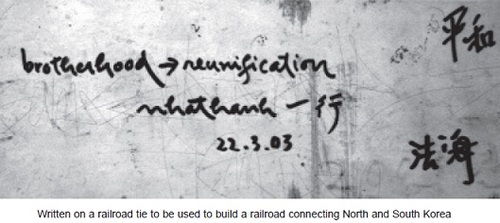
In South Korea we have fifty years of suffering due to the division of our country. We have had this contract of military support with America because they helped us during the Korean War and we are very afraid of future war and violence. After fifty years of meditation and practice you have attained liberation and enlightenment. But we don’t have long years to practice. Within fifteen to twenty days we have to make a decision in our congress whether we will send our soldiers to Iraq and I don’t know whether we Korean people have enough courage to oppose sending soldiers to Iraq if it results in the American soldiers leaving Korea. Please advise us Korean people who have only fifteen days to make a decision. Teach us what to do.
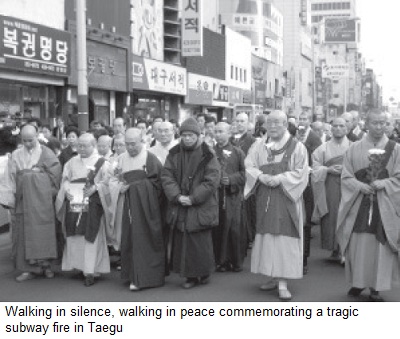
Thay: Enlightenment is not a matter of time. You cannot talk about enlightenment in terms of months or years because enlightenment can come in an instant. We call that sudden enlightenment. Enlightenment to me is a deep understanding of our true situation. There is division, discrimination, and suffering in our countries. That is true everywhere. Even in the United States of America there are many people who feel they are victims of discrimination and injustice. Separation, hatred, and anger are present within the population of America. This is because there is a lack of understanding and compassion, based on the lack of communication. Even in a tradition like Buddhism there is separation, there is misunderstanding, there is anger. The same is true in the Christian religion. There may be separation, anger, and hatred between members of the same family. That is why restoring communication is the most urgent practice for peace.
If there are feelings of shame, of unhappiness, that means there is not true communication within ourselves. We don’t understand ourselves; there is no harmony between the elements of our body and our mind. Restoring harmony within our body is very important for a good practitioner. Restoring harmony in the realm of our feelings and emotions is a very important practice. Without communication, there is no harmony and no well-being. In this state, you cannot do anything to help your family or society. If we know how to bring peace within ourselves, then we know how to bring peace to our family. Once we have restored harmony and communication within ourselves, we will be able to help society. That is why it is very important that different factions of our community should try to communicate with each other. If there is harmony within the people of the South then communication to people of the North will be much easier. If there is harmony and mutual understanding between people of the North and the South, no country in the world can be a threat. Thank you for the question.
Can There Be Peace Without War?
Q: You have mentioned that there is no happiness without suffering. When I change these words we might consider that there is no peace without war. Does this mean that we cannot avoid war; we should just accept it as unavoidable karma? Should we just keep silent and breathe in and out mindfully? What would you do when there is war?
Thay: This is an excellent question. War is not just the bombs falling on us. Every time you have a thought that is full of anger and misunderstanding – that is war. War can be manifested through our way of thinking, our way of speaking, and our way of acting. We may be living in war, not knowing that we are fighting with ourselves and the people around us. With the war in yourself and the war that you inflict on other people, there is suffering within you and there is suffering around you. Maybe in your daily life there are a few moments of ceasefire. But most are moments of war.
Suppose there is a couple who quarrels all the time except when they are very tired; these moments of not quarreling are not exactly peace, they are a ceasefire. Then suppose a friend comes to visit and asks, “Why are you living in war twenty-four hours a day? Why don’t you try living in peace?” And the couple says, “We don’t know. Tell us, what is peace? What can we do in order to have peace?” And the friend tells the couple how to practice in order to bring back harmony into their bodies and into their emotions and feelings and they begin to have a taste of peace. Supported by the friend, the couple’s peace grows every day until one day they say, “It is wonderful, we know what peace is now.” But if there had been no experience of living at war, then how could they experience peace?
Thanks to the mud, the lotus flower is able to grow. The feeling of well-being and peace is possible only when you have experienced the feeling of war. As someone who has lived many decades in the midst of war, I know what war is. And elements of suffering in war have helped me to arrive at the state of being in peace today. If I did not know some practice of peace I would have died in the war of suffering.
We know that we are co-responsible for the situation of our society. By the way we live our daily life we contribute to peace or to war. It is mindfulness that can tell me that I am going in the direction of war and it is the energy of mindfulness that can help me to make a turn and to go in the direction of peace. That is why I have translated mindfulness and concentration as the Holy Spirit; it can transform your life.
The Light of Compassion
Q: Today you told us to imagine we are living in Baghdad and to understand the hearts of the people there. Yesterday I read that Mr. Bush wants to start the war in Iraq, and I couldn’t sleep. I went up into the mountains and I walked all night. I did not have fear; I did not have anger; I did not have misunderstanding. I was frustrated and sad. I have a strong feeling that I want to send a word of consolation and encouragement to the people in Baghdad, but I cannot find any words. I want to hear your consolation and encouragement to us and to the people in Baghdad. I also want to hear what is your action of consolation and encouragement to us and to people in Baghdad?
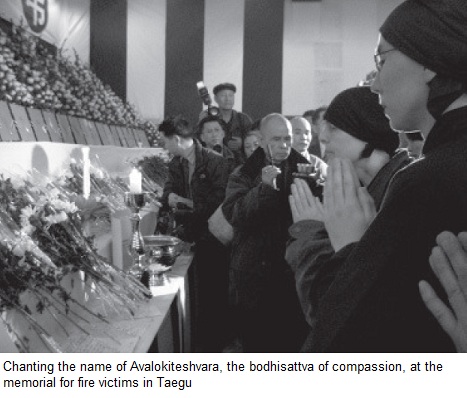
Thay: It is very important to maintain compassion in your heart and not to allow anger and frustration to take over. On that foundation you will find things to do to help the cause of peace. You can write a love letter to your congressman and to your president, urging them to help with the cause of peace. You can contact a friend and urge him or her to do the same. Allow the light and the compassion in your heart to go out to many people around you. In the Bible it says, “If you have the light, display it in a place where many people can see it.” That light is the light of understanding and compassion. Live your daily life in such a way that understanding and compassion can be shared with as many people around you as possible. Cultivating peace is not a matter of days; it should be cultivated generation after generation. Your children and your grandchildren will be your continuation as practitioners of peace. The question is not how much you can do; the question is whether you are doing your best. If you are doing your best then you are in the Pure Land of the Buddha, in the Kingdom of God. You don’t have to worry anymore.
To request permission to reprint this article, either online or in print, contact the Mindfulness Bell at editor@mindfulnessbell.org.
